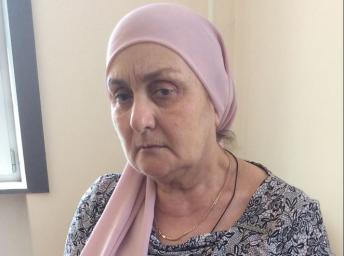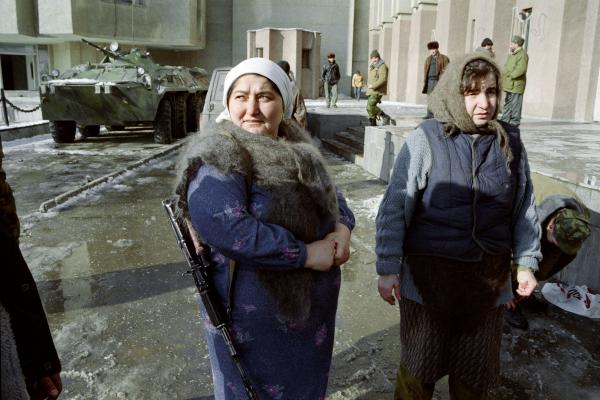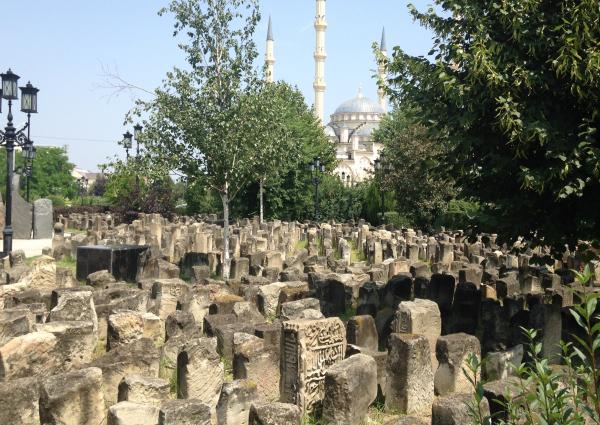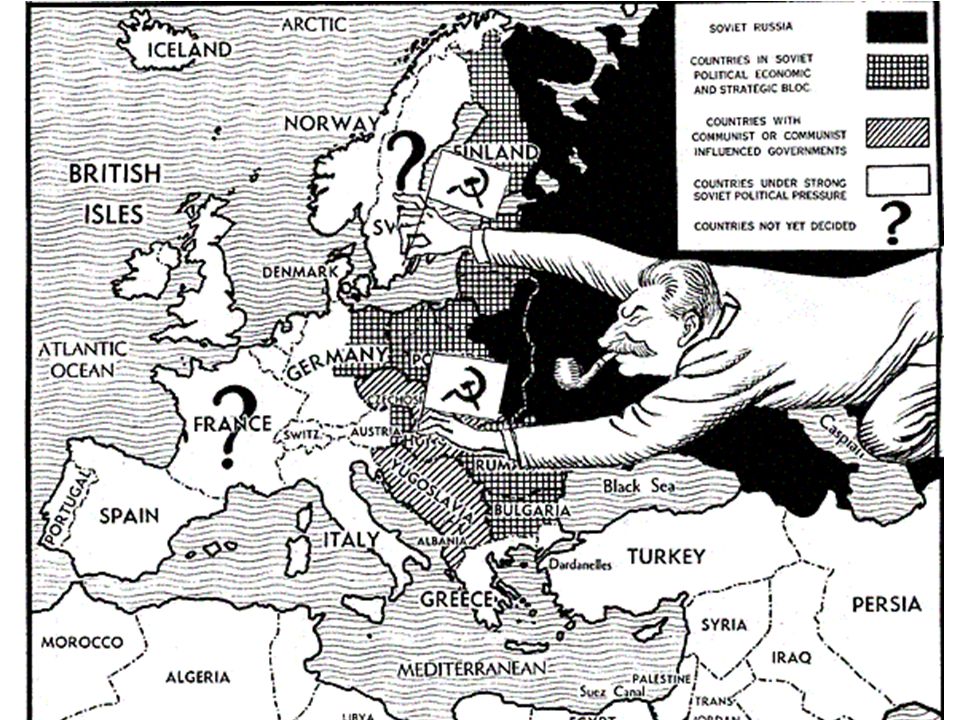Moscow, Grozny and many in the West like to say that the Chechen war is a matter of history, but Madina Magomadova, the leader of the Mothers of Chechnya, points out that “the Chechen war isn't over” because no war ends until the last victim is buried and its horrors pass from the memories of those who experienced it.
The Russian service of Radio France International features a remarkable interview with Magomadova, whom the station identifies as “virtually the last person” still living in Chechnya who “is ready to express an opinion different from that of the official point of view of the local authorities.”

She points out that in the first post-Soviet Chechen war, which was begun by Boris Yeltsin, 150,000 people died; and in the second, which was launched by Vladimir Putin, “more than 350,000,” staggering figures for a nation that numbered only approximately a million at the beginning of the 1990s.
Because of the extreme violence of these two conflicts, Magomadova continues, many who died remain missing. To help find their graves, she and her colleagues in early 1995 established the Mothers of Chechnya organization. At the time, she says, “we couldn't imagine that we would have to work for so long.”
But far more Chechens suffered than died, she says, putting their number at 99 percent of the Chechen population. “If none of theirs died or went missing, they nonetheless lost their homes and their property and became artificially-created people without residences [in Russian, “bomzhi”] and have not been able to recover even now.
“I do not think that the war has concluded,” she says, despite calls by people around the world not to focus on its horrors and despite efforts by the authorities to act as if the rebuilding of apartments and stores is enough. It won’t be over, as Suvorov said, “until the last soldier who died in the war is buried.”
And the powers that be in Grozny and Moscow aren't interested in helping: “Up to now no commission to search for people and determine their fate has been established,” Magomedova says.

In her view, there should be a federal commission like the Truth Commission in South Africa; and until such a commission is set up and operates, until an exhumation laboratory is established in Grozny, “the war for those families who have lost loved ones will continue” long into the future.
The Mothers of Chechnya leader notes that “when we studied in school, we were told that the First Caucasus War lasted 25 years,” a seemingly impossible length of time. But now the post-Soviet Chechen War has lasted that long, whatever anyone says, “and for me,” she adds, “it has not ended.”
The government program for rebuilding Grozny is called “’No Trace of the War.’” It is supposed to remove everything that reminds people about the conflict. But that is impossible: “memory remains.” And so too do the ruins, if one goes as little as 2000 meters from the center of the city, one sees that the destruction has not been touched.
Kadyrov and his regime “have tried to hide the traces of the war in the center, but even if you don’t see them,” Magomedova says, “they remain in the consciousness of people, in their memories. They remain even in the memory of those young children who then were all of five or six. They remember everything.”

Magomadova is absolutely right that most of the world has “moved on” and no longer talks about the Chechen war, why it happened, and who is to blame. But there are some exceptions, including the work of a remarkable pléiade of young Russian historians who are now focusing on the conflict because they recognize that the present and future emerge from the past.
The conclusions of some of them are presented in a new 9150-word article on the Polit.ru portal entitled “Chechnya in Russia: Nationalism and Statehood?” Among the most interesting and intriguing of their findings are these:
- The Soviet system imposed a national identity based on language on many non-Russians who until that time had identified themselves primarily on the basis of religion or clans. The situation with the Chechens and Ingush represents a kind of exception because there is little difference in the languages of the two. But there is an important political one: “the Chechens decided to fight with Russia in the 19th century, but the Ingush did not.”
- “Perestroika was above all about de-institutionalization. The institutes of state power simply fell apart or even ceased to exist … Under these conditions, the Chechens were in a better position than the Russians even when they were in Russian cities because the Chechens could ‘resolve’ problems’” on the basis of earlier clan relations. The Russians, however, had to rely on the state, and so when the state collapsed, they were in “a very bad way.”
- The Soviet system set the stage for what has happened since 1991. In Tatarstan, Moscow allowed Tatars to take control of the key jobs, but in Chechnya, these remained in Russian hands. That meant that after 1991, the Tatar leadership consisted of people Moscow could work with, while in Chechnya, the Russians left and the new Chechen leaders were people Russians couldn't find a common language with.
- The post-Soviet Chechen wars, like the deportations earlier, “strongly changed the character of [Chechen] society, intensifying the anti-Russian component in Chechen identity.” And this had the effect not so much of strengthening Chechen national identity but of causing the Chechens to fall back on their earlier identities of religion and clan.
- In Chechnya today, “for the first time in history a strong state, the Chechen Republic, has emerged. This is already not the Chechen-Ingush Republic or an Islamic state … but a state more or less limited to the Chechen nationality which is quite effective in that it really has a monopoly on legitimate force. The ideology of this state is Islam.’
- The parade of sovereignties by the non-Russian republics in the Russian SFSR also played a role in developments after 1991. Had this movement, which was inspired by Gorbachev and Yeltsin albeit for different reasons, not occurred, Russian federalism and the Russian state would have become very different than they are.
- Russia’s loss in the first Chechen war led other regions to pursue greater independence thus threatening the demise of the Russian Federation. Russia’s victory in the second war showed that Moscow was not prepared to tolerate that and also showed that most of the regional leaders outside of Chechnya were not prepared to do anything to block Moscow when it showed its willingness to use force.
- Nonetheless, Moscow’s victory in the second war, while enormous as far as the rest of Russia is concerned, was less than complete in Chechnya itself. Russia did become a unitary state, but Russia’s relations with Chechnya have become personal, not federal. What is more important, Moscow is not in a position to change that.
- The reason for that is simple, these Russian historians say: “The present-day Chechen state is stronger than the Russian one,” and both Moscow and Grozny recognize that fact.
Related:
- Donbas on its way to becoming Chechnya of 1998, Babchenko says
- Chechen government in exile warns G20 leaders of possible Russian-jihadist collaboration
- Babchenko: The war in Afghanistan was hard on us, Chechnya crippled Russia, but this war will finally finish us
- Another Caucasus war for Putin? Daghestan aligns with Chechnya against Russian law enforcement
- Is Putin about to begin a third Chechen war to escape Ukrainian impasse?
- Exclusive: An interview with a Chechen commander fighting for Ukraine
- Kadyrov -- leading indicator of where Putin is taking Russia, Sokolov says
- Chechens fight on both sides in Ukraine





